Deck 3: Polynomial and Rational Functions
Question
Question
Question
Question
Question
Question
Question
Question
Question
Question
Question
Question
Question
Question
Question
Question
Question
Question
Question
Question
Question
Question
Question
Question
Question
Question
Question
Question
Question
Question
Question
Question
Question
Question
Question
Question
Question
Question
Question
Question
Question
Question
Question
Question
Question
Question
Question
Question
Question
Question
Question
Question
Question
Question
Question
Question
Question
Question
Question
Question
Question
Question
Question
Question
Question
Question
Question
Question
Question
Question
Question
Question
Question
Question
Question
Question
Question
Question
Question
Question

Unlock Deck
Sign up to unlock the cards in this deck!
Unlock Deck
Unlock Deck
1/105
Play
Full screen (f)
Deck 3: Polynomial and Rational Functions
1
Find an equation of the parabola that has a vertex at  and whose graph passes through the point
and whose graph passes through the point 
A)
B)
C)
D)
E)
 and whose graph passes through the point
and whose graph passes through the point 
A)

B)

C)

D)

E)

B
2
Find all real zeros of the polynomial  and determine the mutiplicity of each.
and determine the mutiplicity of each.
A) , multiplicity 2;
, multiplicity 2;  , multiplicity 2
, multiplicity 2
B) , multiplicity 2;
, multiplicity 2;  , multiplicity 2
, multiplicity 2
C) , multiplicity 2;
, multiplicity 2;  , multiplicity 1
, multiplicity 1
D) , multiplicity 2;
, multiplicity 2;  , multiplicity 2
, multiplicity 2
E) , multiplicity 1;
, multiplicity 1;  , multiplicity 1;
, multiplicity 1;  , multiplicity 1;
, multiplicity 1;  , multiplicity 1
, multiplicity 1
 and determine the mutiplicity of each.
and determine the mutiplicity of each.A)
 , multiplicity 2;
, multiplicity 2;  , multiplicity 2
, multiplicity 2B)
 , multiplicity 2;
, multiplicity 2;  , multiplicity 2
, multiplicity 2C)
 , multiplicity 2;
, multiplicity 2;  , multiplicity 1
, multiplicity 1D)
 , multiplicity 2;
, multiplicity 2;  , multiplicity 2
, multiplicity 2E)
 , multiplicity 1;
, multiplicity 1;  , multiplicity 1;
, multiplicity 1;  , multiplicity 1;
, multiplicity 1;  , multiplicity 1
, multiplicity 1E
3
Match the equation with its graph. 
A)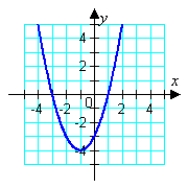
B)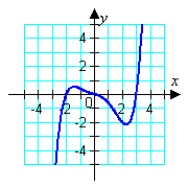
C)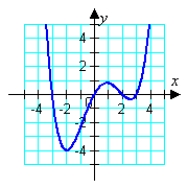
D)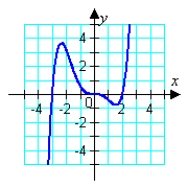
E)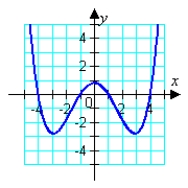

A)

B)

C)

D)

E)

E
4
Describe the right-hand and the left-hand behavior of the graph of 
A) Because the degree is odd and the leading coefficient is positive, the graph falls to the left and falls to the right.
B) Because the degree is odd and the leading coefficient is negative, the graph rises to the left and falls to the right.
C) Because the degree is odd and the leading coefficient is negative, the graph falls to the left and rises to the right.
D) Because the degree is odd and the leading coefficient is positive, the graph rises to the left and rises to the right.
E) Because the degree is even and the leading coefficient is negative, the graph rises to the left and falls to the right.

A) Because the degree is odd and the leading coefficient is positive, the graph falls to the left and falls to the right.
B) Because the degree is odd and the leading coefficient is negative, the graph rises to the left and falls to the right.
C) Because the degree is odd and the leading coefficient is negative, the graph falls to the left and rises to the right.
D) Because the degree is odd and the leading coefficient is positive, the graph rises to the left and rises to the right.
E) Because the degree is even and the leading coefficient is negative, the graph rises to the left and falls to the right.

Unlock Deck
Unlock for access to all 105 flashcards in this deck.
Unlock Deck
k this deck
5
Determine the vertex of the graph of the quadratic function 
A)
B)
C)
D)
E)

A)

B)

C)

D)

E)


Unlock Deck
Unlock for access to all 105 flashcards in this deck.
Unlock Deck
k this deck
6
Describe the right-hand and the left-hand behavior of the graph of 
A) Because the degree is even and the leading coefficient is negative, the graph falls to the left and falls to the right.
B) Because the degree is even and the leading coefficient is negative, the graph rises to the left and falls to the right.
C) Because the degree is even and the leading coefficient is negative, the graph falls to the left and rises to the right.
D) Because the degree is even and the leading coefficient is negative, the graph rises to the left and rises to the right.
E) Because the degree is odd and the leading coefficient is negative, the graph rises to the left and rises to the right.

A) Because the degree is even and the leading coefficient is negative, the graph falls to the left and falls to the right.
B) Because the degree is even and the leading coefficient is negative, the graph rises to the left and falls to the right.
C) Because the degree is even and the leading coefficient is negative, the graph falls to the left and rises to the right.
D) Because the degree is even and the leading coefficient is negative, the graph rises to the left and rises to the right.
E) Because the degree is odd and the leading coefficient is negative, the graph rises to the left and rises to the right.

Unlock Deck
Unlock for access to all 105 flashcards in this deck.
Unlock Deck
k this deck
7
The sum of the length l and the width w of a rectangular region is 180 meters.Write the area A as a function of l.
A)
B)
C)
D)
E)
A)

B)

C)

D)

E)


Unlock Deck
Unlock for access to all 105 flashcards in this deck.
Unlock Deck
k this deck
8
The fuel efficiency, in miles per gallon, for a certain midsize car at various speeds, in miles per hour, is given in the table below. 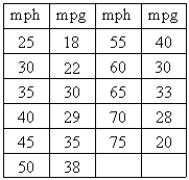 Find a quadratic model for these data.
Find a quadratic model for these data.
A)
B)
C)
D)
E)
 Find a quadratic model for these data.
Find a quadratic model for these data.A)

B)

C)

D)

E)


Unlock Deck
Unlock for access to all 105 flashcards in this deck.
Unlock Deck
k this deck
9
A farmer has 288 feet of fencing and wants to build two identical pens for his prize-winning pigs.The pens will be arranged as shown.Determine the dimensions of a pen that will maximize its area. 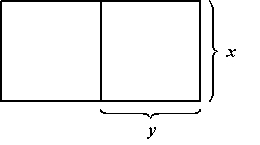
A)
B)
C)
D)
E)

A)

B)

C)

D)

E)


Unlock Deck
Unlock for access to all 105 flashcards in this deck.
Unlock Deck
k this deck
10
Determine the vertex of the graph of the quadratic function 
A)
B)
C)
D)
E)

A)

B)

C)

D)

E)


Unlock Deck
Unlock for access to all 105 flashcards in this deck.
Unlock Deck
k this deck
11
Find all real zeros of the polynomial  and determine the mutiplicity of each.
and determine the mutiplicity of each.
A) , multiplicity 2;
, multiplicity 2;  , multiplicity 1;
, multiplicity 1;  , multiplicity 1
, multiplicity 1
B) , multiplicity 2;
, multiplicity 2;  , multiplicity 2
, multiplicity 2
C) , multiplicity 2;
, multiplicity 2;  , multiplicity 1;
, multiplicity 1;  , multiplicity 1
, multiplicity 1
D) , multiplicity 2;
, multiplicity 2;  , multiplicity 2
, multiplicity 2
E) , multiplicity 1;
, multiplicity 1;  , multiplicity 1;
, multiplicity 1;  , multiplicity 1;
, multiplicity 1;  , multiplicity 1
, multiplicity 1
 and determine the mutiplicity of each.
and determine the mutiplicity of each.A)
 , multiplicity 2;
, multiplicity 2;  , multiplicity 1;
, multiplicity 1;  , multiplicity 1
, multiplicity 1B)
 , multiplicity 2;
, multiplicity 2;  , multiplicity 2
, multiplicity 2C)
 , multiplicity 2;
, multiplicity 2;  , multiplicity 1;
, multiplicity 1;  , multiplicity 1
, multiplicity 1D)
 , multiplicity 2;
, multiplicity 2;  , multiplicity 2
, multiplicity 2E)
 , multiplicity 1;
, multiplicity 1;  , multiplicity 1;
, multiplicity 1;  , multiplicity 1;
, multiplicity 1;  , multiplicity 1
, multiplicity 1
Unlock Deck
Unlock for access to all 105 flashcards in this deck.
Unlock Deck
k this deck
12
Graph the given function. 
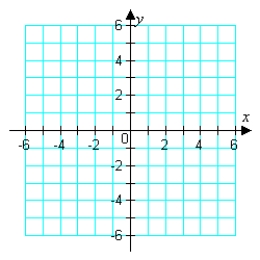
A)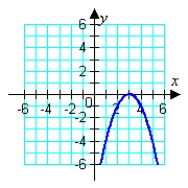
B)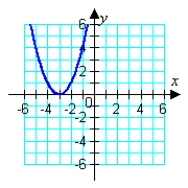
C)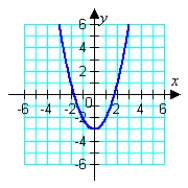
D)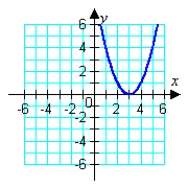
E)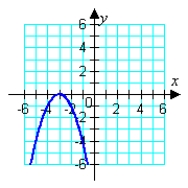


A)

B)

C)

D)

E)


Unlock Deck
Unlock for access to all 105 flashcards in this deck.
Unlock Deck
k this deck
13
Describe the right-hand and the left-hand behavior of the graph of 
A) Because the degree is odd and the leading coefficient is positive, the graph falls to the left and falls to the right.
B) Because the degree is odd and the leading coefficient is positive, the graph rises to the left and falls to the right.
C) Because the degree is odd and the leading coefficient is positive, the graph falls to the left and rises to the right.
D) Because the degree is odd and the leading coefficient is positive, the graph rises to the left and rises to the right.
E) Because the degree is even and the leading coefficient is positive, the graph rises to the left and rises to the right.

A) Because the degree is odd and the leading coefficient is positive, the graph falls to the left and falls to the right.
B) Because the degree is odd and the leading coefficient is positive, the graph rises to the left and falls to the right.
C) Because the degree is odd and the leading coefficient is positive, the graph falls to the left and rises to the right.
D) Because the degree is odd and the leading coefficient is positive, the graph rises to the left and rises to the right.
E) Because the degree is even and the leading coefficient is positive, the graph rises to the left and rises to the right.

Unlock Deck
Unlock for access to all 105 flashcards in this deck.
Unlock Deck
k this deck
14
The sum of the length l and the width w of a rectangular region is 190 meters.Find the dimensions that produce the greatest area.
A)
B)
C)
D)
E)
A)

B)

C)

D)

E)


Unlock Deck
Unlock for access to all 105 flashcards in this deck.
Unlock Deck
k this deck
15
The height in feet of a projectile with an initial velocity of 96 feet per second and an initial height of 75 feet is a function of time t, in seconds, given by  Find the maximum height of the projectile.
Find the maximum height of the projectile.
A) 254 ft
B) 219 ft
C) 263 ft
D) 105 ft
E) 315 ft
 Find the maximum height of the projectile.
Find the maximum height of the projectile.A) 254 ft
B) 219 ft
C) 263 ft
D) 105 ft
E) 315 ft

Unlock Deck
Unlock for access to all 105 flashcards in this deck.
Unlock Deck
k this deck
16
The path of a diver is given by  where
where  is the height (in feet) and
is the height (in feet) and  is the horizontal distance from the end of the diving board (in feet).Find the maximum height of the diver.
is the horizontal distance from the end of the diving board (in feet).Find the maximum height of the diver.
A) 12 feet
B) 13 feet
C) 10 feet
D) 14 feet
E) 17 feet
 where
where  is the height (in feet) and
is the height (in feet) and  is the horizontal distance from the end of the diving board (in feet).Find the maximum height of the diver.
is the horizontal distance from the end of the diving board (in feet).Find the maximum height of the diver.A) 12 feet
B) 13 feet
C) 10 feet
D) 14 feet
E) 17 feet

Unlock Deck
Unlock for access to all 105 flashcards in this deck.
Unlock Deck
k this deck
17
Compare the graph of  with
with 
A) shifts right
shifts right  units, shifts downward
units, shifts downward  units, and shrinks by a factor of
units, and shrinks by a factor of 
B) shifts right
shifts right  units, shifts upward
units, shifts upward  units, and stretches by a factor of
units, and stretches by a factor of 
C) shifts left
shifts left  units, shifts downward
units, shifts downward  units, and stretches by a factor of
units, and stretches by a factor of 
D) shifts right
shifts right  units, shifts upward
units, shifts upward  units, and shrinks by a factor of
units, and shrinks by a factor of 
E) shifts left
shifts left  units, shifts upward
units, shifts upward  units, and stretches by a factor of
units, and stretches by a factor of 
 with
with 
A)
 shifts right
shifts right  units, shifts downward
units, shifts downward  units, and shrinks by a factor of
units, and shrinks by a factor of 
B)
 shifts right
shifts right  units, shifts upward
units, shifts upward  units, and stretches by a factor of
units, and stretches by a factor of 
C)
 shifts left
shifts left  units, shifts downward
units, shifts downward  units, and stretches by a factor of
units, and stretches by a factor of 
D)
 shifts right
shifts right  units, shifts upward
units, shifts upward  units, and shrinks by a factor of
units, and shrinks by a factor of 
E)
 shifts left
shifts left  units, shifts upward
units, shifts upward  units, and stretches by a factor of
units, and stretches by a factor of 

Unlock Deck
Unlock for access to all 105 flashcards in this deck.
Unlock Deck
k this deck
18
Examine the leading term and determine the far-left and far-right behavior of the graph of the polynomial function 
A) down to the far left, up to the far right
B) down to the far left, down to the far right
C) up to the far left, up to the far right
D) up to the far left, down to the far right
E) cannot be determined

A) down to the far left, up to the far right
B) down to the far left, down to the far right
C) up to the far left, up to the far right
D) up to the far left, down to the far right
E) cannot be determined

Unlock Deck
Unlock for access to all 105 flashcards in this deck.
Unlock Deck
k this deck
19
The fuel efficiency, in miles per gallon, for a certain midsize car at various speeds, in miles per hour, is given in the table below. 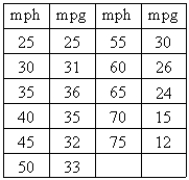 Find a quadratic model for these data and use it to predict the fuel efficiency of this car when it is traveling at a speed of 40 mph.Do not round any values in your calculations but round the final answer to the nearest tenth.
Find a quadratic model for these data and use it to predict the fuel efficiency of this car when it is traveling at a speed of 40 mph.Do not round any values in your calculations but round the final answer to the nearest tenth.
A) 33.9 mpg
B) 33.7 mpg
C) 35.7 mpg
D) 32.7 mpg
E) 33.9 mpg
 Find a quadratic model for these data and use it to predict the fuel efficiency of this car when it is traveling at a speed of 40 mph.Do not round any values in your calculations but round the final answer to the nearest tenth.
Find a quadratic model for these data and use it to predict the fuel efficiency of this car when it is traveling at a speed of 40 mph.Do not round any values in your calculations but round the final answer to the nearest tenth.A) 33.9 mpg
B) 33.7 mpg
C) 35.7 mpg
D) 32.7 mpg
E) 33.9 mpg

Unlock Deck
Unlock for access to all 105 flashcards in this deck.
Unlock Deck
k this deck
20
Find an equation of the parabola below. 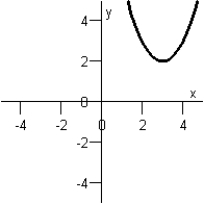
A)
B)
C)
D)
E)

A)

B)

C)

D)

E)


Unlock Deck
Unlock for access to all 105 flashcards in this deck.
Unlock Deck
k this deck
21
Use long division to divide. 
A)
B)
C)
D)
E)

A)

B)

C)

D)

E)


Unlock Deck
Unlock for access to all 105 flashcards in this deck.
Unlock Deck
k this deck
22
Write  in the form
in the form  when
when 
A)
B)
C)
D)
E)
 in the form
in the form  when
when 
A)

B)

C)

D)

E)


Unlock Deck
Unlock for access to all 105 flashcards in this deck.
Unlock Deck
k this deck
23
Use long division to divide. 
A)
B)
C)
D)
E)

A)

B)

C)

D)

E)


Unlock Deck
Unlock for access to all 105 flashcards in this deck.
Unlock Deck
k this deck
24
Use long division to divide. 
A)
B)
C)
D)
E)

A)

B)

C)

D)

E)


Unlock Deck
Unlock for access to all 105 flashcards in this deck.
Unlock Deck
k this deck
25
Use long division to divide the first polynomial below by the second. 

A)
B)
C)
D)
E)


A)

B)

C)

D)

E)


Unlock Deck
Unlock for access to all 105 flashcards in this deck.
Unlock Deck
k this deck
26
Using the factors  and
and  , find the remaining factor(s) of
, find the remaining factor(s) of  and write the polynomial in fully factored form.
and write the polynomial in fully factored form.
A)
B)
C)
D)
E)
 and
and  , find the remaining factor(s) of
, find the remaining factor(s) of  and write the polynomial in fully factored form.
and write the polynomial in fully factored form.A)

B)

C)

D)

E)


Unlock Deck
Unlock for access to all 105 flashcards in this deck.
Unlock Deck
k this deck
27
Find all the real zeros of the polynomial function  and determine the multiplicity of each.
and determine the multiplicity of each.
A) , multiplicity 2;
, multiplicity 2;  , multiplicity 1
, multiplicity 1
B) , multiplicity 1;
, multiplicity 1;  , multiplicity 1;
, multiplicity 1;  , multiplicity 1
, multiplicity 1
C) , multiplicity 2;
, multiplicity 2;  , multiplicity 1
, multiplicity 1
D) , multiplicity 1;
, multiplicity 1;  , multiplicity 1;
, multiplicity 1;  , multiplicity 1
, multiplicity 1
E) , multiplicity 3
, multiplicity 3
 and determine the multiplicity of each.
and determine the multiplicity of each.A)
 , multiplicity 2;
, multiplicity 2;  , multiplicity 1
, multiplicity 1B)
 , multiplicity 1;
, multiplicity 1;  , multiplicity 1;
, multiplicity 1;  , multiplicity 1
, multiplicity 1C)
 , multiplicity 2;
, multiplicity 2;  , multiplicity 1
, multiplicity 1D)
 , multiplicity 1;
, multiplicity 1;  , multiplicity 1;
, multiplicity 1;  , multiplicity 1
, multiplicity 1E)
 , multiplicity 3
, multiplicity 3
Unlock Deck
Unlock for access to all 105 flashcards in this deck.
Unlock Deck
k this deck
28
Use synthetic division to divide  by
by 
A)
B)
C)
D)
E)
 by
by 
A)

B)

C)

D)

E)


Unlock Deck
Unlock for access to all 105 flashcards in this deck.
Unlock Deck
k this deck
29
Use synthetic division to divide. 
A)
B)
C)
D)
E)

A)

B)

C)

D)

E)


Unlock Deck
Unlock for access to all 105 flashcards in this deck.
Unlock Deck
k this deck
30
Using the factors  and
and  , find the remaining factor(s) of
, find the remaining factor(s) of  and write the polynomial in fully factored form.
and write the polynomial in fully factored form.
A)
B)
C)
D)
E)
 and
and  , find the remaining factor(s) of
, find the remaining factor(s) of  and write the polynomial in fully factored form.
and write the polynomial in fully factored form.A)

B)

C)

D)

E)


Unlock Deck
Unlock for access to all 105 flashcards in this deck.
Unlock Deck
k this deck
31
A closed box is to be constructed from a rectangular sheet of cardboard that measures 57 inches by 28 inches.The box is made by cutting rectangles that measure x inches by 2x inches from two of the corners and by cutting two squares that measure x inches by x inches from the top and from the bottom of the rectangle, as shown in the following figure.Use a graphing calculator to determine what value of x (to the nearest thousandth of an inch) will produce a box with maximum volume? 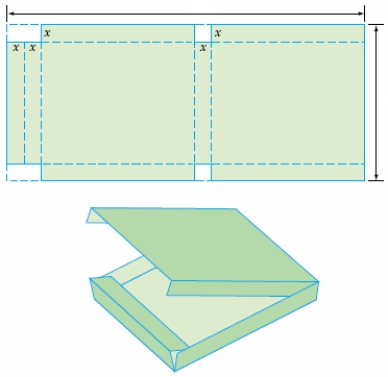
A) 5.314
B) 21.000
C) 4.222
D) 16.686
E) 3.707

A) 5.314
B) 21.000
C) 4.222
D) 16.686
E) 3.707

Unlock Deck
Unlock for access to all 105 flashcards in this deck.
Unlock Deck
k this deck
32
Use synthetic division and the Factor Theorem to determine whether or not  is a factor of
is a factor of 
A) Yes, is a factor.
is a factor.
B) No, is not a factor.
is not a factor.
 is a factor of
is a factor of 
A) Yes,
 is a factor.
is a factor.B) No,
 is not a factor.
is not a factor.
Unlock Deck
Unlock for access to all 105 flashcards in this deck.
Unlock Deck
k this deck
33
Use synthetic division and the Factor Theorem to determine whether or not  is a factor of
is a factor of 
A) No, is not a factor.
is not a factor.
B) Yes, is a factor.
is a factor.
 is a factor of
is a factor of 
A) No,
 is not a factor.
is not a factor.B) Yes,
 is a factor.
is a factor.
Unlock Deck
Unlock for access to all 105 flashcards in this deck.
Unlock Deck
k this deck
34
Sketch the graph of the polynomial function  Do not use a graphing calculator.
Do not use a graphing calculator.
A)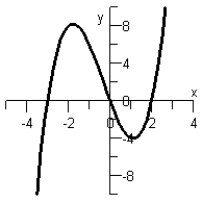
B)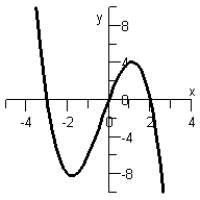
C)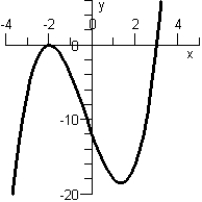
D)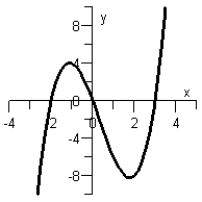
E)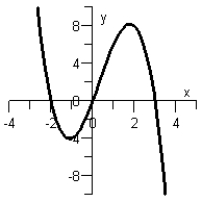
 Do not use a graphing calculator.
Do not use a graphing calculator.A)

B)

C)

D)

E)


Unlock Deck
Unlock for access to all 105 flashcards in this deck.
Unlock Deck
k this deck
35
Match the graph with one of the following functions below. 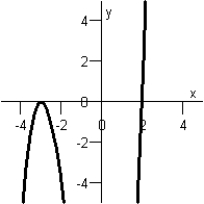 Function I :
Function I :  Function II :
Function II :  Function III :
Function III :  Function IV :
Function IV :  Function V :
Function V : 
A) Function I
B) Function IV
C) Function V
D) Function II
E) Function III
 Function I :
Function I :  Function II :
Function II :  Function III :
Function III :  Function IV :
Function IV :  Function V :
Function V : 
A) Function I
B) Function IV
C) Function V
D) Function II
E) Function III

Unlock Deck
Unlock for access to all 105 flashcards in this deck.
Unlock Deck
k this deck
36
Use synthetic division to divide. 
A)
B)
C)
D)
E)

A)

B)

C)

D)

E)


Unlock Deck
Unlock for access to all 105 flashcards in this deck.
Unlock Deck
k this deck
37
Sketch the graph of the polynomial function below. 
A)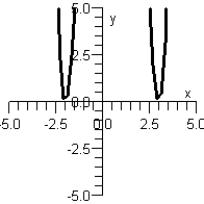
B)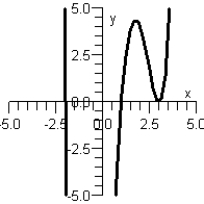
C)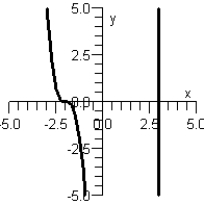
D)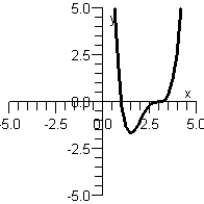
E)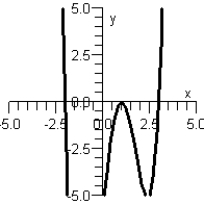

A)

B)

C)

D)

E)


Unlock Deck
Unlock for access to all 105 flashcards in this deck.
Unlock Deck
k this deck
38
Use synthetic division to divide. 
A)
B)
C)
D)
E)

A)

B)

C)

D)

E)


Unlock Deck
Unlock for access to all 105 flashcards in this deck.
Unlock Deck
k this deck
39
Find the real zeros of the polynomial function  and determine the multiplicity of each.
and determine the multiplicity of each.
A) , multiplicity 2;
, multiplicity 2;  , multiplicity 3
, multiplicity 3
B) , multiplicity 2;
, multiplicity 2;  , multiplicity 1;
, multiplicity 1;  , multiplicity 2
, multiplicity 2
C) , multiplicity 3;
, multiplicity 3;  , multiplicity 2
, multiplicity 2
D) , multiplicity 3;
, multiplicity 3;  , multiplicity 2
, multiplicity 2
E) , multiplicity 2;
, multiplicity 2;  , multiplicity 2;
, multiplicity 2;  , multiplicity 1
, multiplicity 1
 and determine the multiplicity of each.
and determine the multiplicity of each.A)
 , multiplicity 2;
, multiplicity 2;  , multiplicity 3
, multiplicity 3B)
 , multiplicity 2;
, multiplicity 2;  , multiplicity 1;
, multiplicity 1;  , multiplicity 2
, multiplicity 2C)
 , multiplicity 3;
, multiplicity 3;  , multiplicity 2
, multiplicity 2D)
 , multiplicity 3;
, multiplicity 3;  , multiplicity 2
, multiplicity 2E)
 , multiplicity 2;
, multiplicity 2;  , multiplicity 2;
, multiplicity 2;  , multiplicity 1
, multiplicity 1
Unlock Deck
Unlock for access to all 105 flashcards in this deck.
Unlock Deck
k this deck
40
If  , use synthetic division to evaluate
, use synthetic division to evaluate 
A)
B)
C)
D)
E)
 , use synthetic division to evaluate
, use synthetic division to evaluate 
A)

B)

C)

D)

E)


Unlock Deck
Unlock for access to all 105 flashcards in this deck.
Unlock Deck
k this deck
41
Simplify the rational expression,  , by using long division or synthetic division.
, by using long division or synthetic division.
A)
B)
C)
D)
E)
 , by using long division or synthetic division.
, by using long division or synthetic division.A)

B)

C)

D)

E)


Unlock Deck
Unlock for access to all 105 flashcards in this deck.
Unlock Deck
k this deck
42
Find all the rational zeros of the function 
A)
B)
C)
D)
E)

A)

B)

C)

D)

E)


Unlock Deck
Unlock for access to all 105 flashcards in this deck.
Unlock Deck
k this deck
43
Write the complex number  in standard form.
in standard form.
A)
B)
C)
D)
E)
 in standard form.
in standard form.A)

B)

C)

D)

E)


Unlock Deck
Unlock for access to all 105 flashcards in this deck.
Unlock Deck
k this deck
44
Find the zeros of the polynomial function below.If a zero is a multiple zero, state its multiplicity. 
A)


B)


C)


D)


E)



A)



B)



C)



D)



E)




Unlock Deck
Unlock for access to all 105 flashcards in this deck.
Unlock Deck
k this deck
45
Find all real solutions of the polynomial equation 
A)
B)
C)
D)
E)

A)

B)

C)

D)

E)


Unlock Deck
Unlock for access to all 105 flashcards in this deck.
Unlock Deck
k this deck
46
Use the Rational Zero Test to list all possible rational zeros of the polynomial function 
A)
B)
C)
D)
E)

A)

B)

C)

D)

E)


Unlock Deck
Unlock for access to all 105 flashcards in this deck.
Unlock Deck
k this deck
47
Simplify the rational expression,  , by using long division or synthetic division.
, by using long division or synthetic division.
A)
B)
C)
D)
E)
 , by using long division or synthetic division.
, by using long division or synthetic division.A)

B)

C)

D)

E)


Unlock Deck
Unlock for access to all 105 flashcards in this deck.
Unlock Deck
k this deck
48
Find all the real zeros of 
A)
B)
C)
D)
E)

A)

B)

C)

D)

E)


Unlock Deck
Unlock for access to all 105 flashcards in this deck.
Unlock Deck
k this deck
49
Find all real solutions of the polynomial equation 
A)

B)
C)
D)
E)

A)


B)

C)

D)

E)


Unlock Deck
Unlock for access to all 105 flashcards in this deck.
Unlock Deck
k this deck
50
A farmer wants to enlarge an existing rectangular pig pen such that the total area of the new pen is twice as large as the original pen.The current pen's dimensions are 25' × 27'.The farmer wants to add 13 feet more to the long side than to the the short side.Find the dimensions of the new pen.
A) 5 feet × 18 feet
B) 30 feet × 45 feet
C) 30 feet × 32 feet
D) 30 feet × 43 feet
E) 30 feet × 40 feet
A) 5 feet × 18 feet
B) 30 feet × 45 feet
C) 30 feet × 32 feet
D) 30 feet × 43 feet
E) 30 feet × 40 feet

Unlock Deck
Unlock for access to all 105 flashcards in this deck.
Unlock Deck
k this deck
51
An open box is to be made from a square piece of cardboard, 72 inches on a side, by cutting equal squares with sides of length x from the corners and turning up the sides (see figure below).After determining the function V, in terms of x, that represents the volume of the box, use a graphing utility to estimate the dimensions that will maximize its volume. 
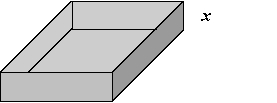
A) ×
×  ×
× 
B) ×
×  ×
× 
C) ×
×  ×
× 
D) ×
×  ×
× 
E) ×
×  ×
× 


A)
 ×
×  ×
× 
B)
 ×
×  ×
× 
C)
 ×
×  ×
× 
D)
 ×
×  ×
× 
E)
 ×
×  ×
× 

Unlock Deck
Unlock for access to all 105 flashcards in this deck.
Unlock Deck
k this deck
52
Find all the rational zeros of the function 
A)
B)
C)
D)
E)

A)

B)

C)

D)

E)


Unlock Deck
Unlock for access to all 105 flashcards in this deck.
Unlock Deck
k this deck
53
Write the complex number in standard form. 
A)
B)
C)
D)
E)

A)

B)

C)

D)

E)


Unlock Deck
Unlock for access to all 105 flashcards in this deck.
Unlock Deck
k this deck
54
Evaluate the power of i. 
A)
B)
C)
D)
E)

A)

B)

C)

D)

E)


Unlock Deck
Unlock for access to all 105 flashcards in this deck.
Unlock Deck
k this deck
55
The length of a rectangular box is 1 inch more than twice the height of the box, and the width is 3 inches more than the height. If the volume of the box is 440 cubic inches, find the dimensions of the box. 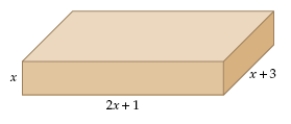
A) 5 in. by 11 in. by 8 in.
B) 4 in. by 9 in. by 7 in.
C) 109 in. by 219 in. by 112 in.
D) 5.5 in. by 12 in. by 8.5 in.
E) 106 in. by 213 in. by 109 in.

A) 5 in. by 11 in. by 8 in.
B) 4 in. by 9 in. by 7 in.
C) 109 in. by 219 in. by 112 in.
D) 5.5 in. by 12 in. by 8.5 in.
E) 106 in. by 213 in. by 109 in.

Unlock Deck
Unlock for access to all 105 flashcards in this deck.
Unlock Deck
k this deck
56
Find real numbers a and b such that the equation  is true.
is true.
A)
B)
C)
D)
E)
 is true.
is true.A)

B)

C)

D)

E)


Unlock Deck
Unlock for access to all 105 flashcards in this deck.
Unlock Deck
k this deck
57
Use the zero or root feature of a graphing utility to approximate the real zeros of the function  accurate to the nearest thousandth.
accurate to the nearest thousandth.
A) , 1.732, 1.414
, 1.732, 1.414
B) -1.732, -1.414
C) 1.732,
1.732,  1.414
1.414
D) 1.732, 1.414
E) , - 1.732, 1.414
, - 1.732, 1.414
 accurate to the nearest thousandth.
accurate to the nearest thousandth.A)
 , 1.732, 1.414
, 1.732, 1.414B) -1.732, -1.414
C)
 1.732,
1.732,  1.414
1.414D) 1.732, 1.414
E)
 , - 1.732, 1.414
, - 1.732, 1.414
Unlock Deck
Unlock for access to all 105 flashcards in this deck.
Unlock Deck
k this deck
58
Use the Rational Zero Test to list possible rational zeros for the polynomial function below. 
A)
B)
C)
D)
E)

A)

B)

C)

D)

E)


Unlock Deck
Unlock for access to all 105 flashcards in this deck.
Unlock Deck
k this deck
59
Find all the real zeros of 
A)
B)
C)
D)
E)

A)

B)

C)

D)

E)


Unlock Deck
Unlock for access to all 105 flashcards in this deck.
Unlock Deck
k this deck
60
A company that produces video games estimates that the profit  (in dollars) for selling a new game is given by
(in dollars) for selling a new game is given by 
 where
where  is the advertising expense (in tens of thousands of dollars).Using this model, how much should the company spend on advertising to obtain a profit of $6,500,000? Round to the nearest dollar.
is the advertising expense (in tens of thousands of dollars).Using this model, how much should the company spend on advertising to obtain a profit of $6,500,000? Round to the nearest dollar.
A) $399,893 or $744,397
B) $433,844 or $721,190
C) $315,902 or $794,255
D) $368,914 or $764,017
E) $344,417 or $778,509
 (in dollars) for selling a new game is given by
(in dollars) for selling a new game is given by 
 where
where  is the advertising expense (in tens of thousands of dollars).Using this model, how much should the company spend on advertising to obtain a profit of $6,500,000? Round to the nearest dollar.
is the advertising expense (in tens of thousands of dollars).Using this model, how much should the company spend on advertising to obtain a profit of $6,500,000? Round to the nearest dollar.A) $399,893 or $744,397
B) $433,844 or $721,190
C) $315,902 or $794,255
D) $368,914 or $764,017
E) $344,417 or $778,509

Unlock Deck
Unlock for access to all 105 flashcards in this deck.
Unlock Deck
k this deck
61
Simplify and write the following complex number in standard form. 
A)
B)
C)
D)
E)

A)

B)

C)

D)

E)


Unlock Deck
Unlock for access to all 105 flashcards in this deck.
Unlock Deck
k this deck
62
Combine  and write the answer in standard form.
and write the answer in standard form.
A)
B)
C)
D)
E)
 and write the answer in standard form.
and write the answer in standard form.A)

B)

C)

D)

E)


Unlock Deck
Unlock for access to all 105 flashcards in this deck.
Unlock Deck
k this deck
63
Simplify and write the following complex number in standard form. 
A)
B)
C)
D)
E) 0

A)

B)

C)

D)

E) 0

Unlock Deck
Unlock for access to all 105 flashcards in this deck.
Unlock Deck
k this deck
64
Use the quadratic formula to solve 
A)
B)
C)
D)
E)

A)

B)

C)

D)

E)


Unlock Deck
Unlock for access to all 105 flashcards in this deck.
Unlock Deck
k this deck
65
Write the polynomial  as the product of factors that are irreducible over the rationals.
as the product of factors that are irreducible over the rationals.
A)
B)
C)
D)
E)
 as the product of factors that are irreducible over the rationals.
as the product of factors that are irreducible over the rationals.A)

B)

C)

D)

E)


Unlock Deck
Unlock for access to all 105 flashcards in this deck.
Unlock Deck
k this deck
66
Simplify  and write the answer in standard form.
and write the answer in standard form.
A)
B)
C)
D)
E)
 and write the answer in standard form.
and write the answer in standard form.A)

B)

C)

D)

E)


Unlock Deck
Unlock for access to all 105 flashcards in this deck.
Unlock Deck
k this deck
67
Simplify  and write the answer in standard form.
and write the answer in standard form.
A)
B)
C)
D)
E)
 and write the answer in standard form.
and write the answer in standard form.A)

B)

C)

D)

E)


Unlock Deck
Unlock for access to all 105 flashcards in this deck.
Unlock Deck
k this deck
68
Simplify  and write the answer in standard form.
and write the answer in standard form.
A)
B)
C)
D)
E)
 and write the answer in standard form.
and write the answer in standard form.A)

B)

C)

D)

E)


Unlock Deck
Unlock for access to all 105 flashcards in this deck.
Unlock Deck
k this deck
69
Classify whether the following numbers are in the Mandelbrot Set. I :  II :
II :  III :
III : 
A) Only numbers I and III are in the Mandelbrot Set.
B) Only number II is in the Mandelbrot Set.
C) Only number I is in the Mandelbrot Set.
D) None are in the Mandelbrot Set.
E) Only numbers II and III are in the Mandelbrot Set.
 II :
II :  III :
III : 
A) Only numbers I and III are in the Mandelbrot Set.
B) Only number II is in the Mandelbrot Set.
C) Only number I is in the Mandelbrot Set.
D) None are in the Mandelbrot Set.
E) Only numbers II and III are in the Mandelbrot Set.

Unlock Deck
Unlock for access to all 105 flashcards in this deck.
Unlock Deck
k this deck
70
Write the following expression as a complex number in standard form. 
A)
B)
C)
D)
E)

A)

B)

C)

D)

E)


Unlock Deck
Unlock for access to all 105 flashcards in this deck.
Unlock Deck
k this deck
71
Simplify and write the following complex number in standard form. 
A)
B)
C)
D)
E)

A)

B)

C)

D)

E)


Unlock Deck
Unlock for access to all 105 flashcards in this deck.
Unlock Deck
k this deck
72
Simplify  and write the answer in standard form.
and write the answer in standard form.
A)
B)
C)
D)
E)
 and write the answer in standard form.
and write the answer in standard form.A)

B)

C)

D)

E)


Unlock Deck
Unlock for access to all 105 flashcards in this deck.
Unlock Deck
k this deck
73
Write  as a product of linear factors given that
as a product of linear factors given that  and
and  are zeros of the polynomial.
are zeros of the polynomial.
A)
B)
C)
D)
E)
 as a product of linear factors given that
as a product of linear factors given that  and
and  are zeros of the polynomial.
are zeros of the polynomial.A)

B)

C)

D)

E)


Unlock Deck
Unlock for access to all 105 flashcards in this deck.
Unlock Deck
k this deck
74
Find all the zeros of the polynomial function  and write the polynomial as a product of its linear factors.
and write the polynomial as a product of its linear factors.
A) ,
,  ,
,  ;
; 
B) ,
,  ,
,  ;
; 
C) ,
,  ,
,  ;
; 
D) ,
,  ,
,  ;
; 
E) ,
,  ,
,  ;
; 
 and write the polynomial as a product of its linear factors.
and write the polynomial as a product of its linear factors.A)
 ,
,  ,
,  ;
; 
B)
 ,
,  ,
,  ;
; 
C)
 ,
,  ,
,  ;
; 
D)
 ,
,  ,
,  ;
; 
E)
 ,
,  ,
,  ;
; 

Unlock Deck
Unlock for access to all 105 flashcards in this deck.
Unlock Deck
k this deck
75
Plot the complex number below. 
A)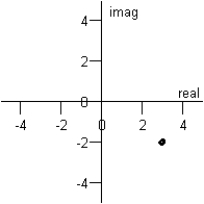
B)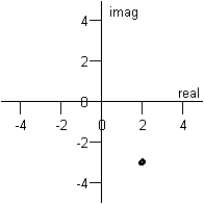
C)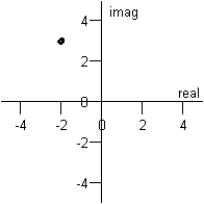
D)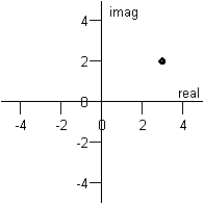
E)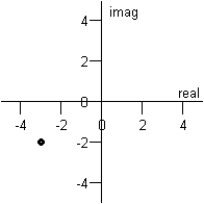

A)

B)

C)

D)

E)


Unlock Deck
Unlock for access to all 105 flashcards in this deck.
Unlock Deck
k this deck
76
The demand and cost equations for a stethoscope are given by  and
and  where
where  is the unit price (in dollars),
is the unit price (in dollars),  is the total cost (in dollars), and
is the total cost (in dollars), and  is the number of units.The total profit
is the number of units.The total profit  (in dollars) obtained by producing and selling
(in dollars) obtained by producing and selling  units is given by
units is given by  Determine a price
Determine a price  that would yield a profit of $4 million.
that would yield a profit of $4 million.
A) $22.21
B) $44.43
C) $88.85
D) $99.96
E) $66.64
 and
and  where
where  is the unit price (in dollars),
is the unit price (in dollars),  is the total cost (in dollars), and
is the total cost (in dollars), and  is the number of units.The total profit
is the number of units.The total profit  (in dollars) obtained by producing and selling
(in dollars) obtained by producing and selling  units is given by
units is given by  Determine a price
Determine a price  that would yield a profit of $4 million.
that would yield a profit of $4 million.A) $22.21
B) $44.43
C) $88.85
D) $99.96
E) $66.64

Unlock Deck
Unlock for access to all 105 flashcards in this deck.
Unlock Deck
k this deck
77
Determine the number of zeros of the polynomial function below. 
A) 1
B) 3
C) 4
D) 5
E) 6

A) 1
B) 3
C) 4
D) 5
E) 6

Unlock Deck
Unlock for access to all 105 flashcards in this deck.
Unlock Deck
k this deck
78
Write  as a product of linear factors.
as a product of linear factors.
A)
B)
C)
D)
E)
 as a product of linear factors.
as a product of linear factors.A)

B)

C)

D)

E)


Unlock Deck
Unlock for access to all 105 flashcards in this deck.
Unlock Deck
k this deck
79
Write  as a product of linear factors given that
as a product of linear factors given that  and
and  are zeros of the polynomial.
are zeros of the polynomial.
A)
B)
C)
D)
E)
 as a product of linear factors given that
as a product of linear factors given that  and
and  are zeros of the polynomial.
are zeros of the polynomial.A)

B)

C)

D)

E)


Unlock Deck
Unlock for access to all 105 flashcards in this deck.
Unlock Deck
k this deck
80
Simplify and write the following complex number in standard form. 
A)
B)
C)
D)
E)

A)

B)

C)

D)

E)


Unlock Deck
Unlock for access to all 105 flashcards in this deck.
Unlock Deck
k this deck



